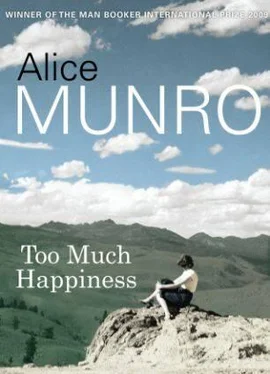It follows, unsurprisingly in such a story, that my father smoked and drank too much-though most of his friends did too, whatever their situations. He had a stroke while still in his fifties, and died after several months in bed. And it was not a surprise that my mother nursed him all that time, kept him at home, where instead of becoming tender and appreciative he called her quite foul names, thickened by his misfortune but always decipherable to her, and to him, it seemed, quite gratifying.
At the funeral a woman said to me, “Your mother is a saint.” I remember this woman’s appearance quite well, though not her name. White curls, rouged cheeks, dainty features. A tearful whisper. I disliked her instantly. I scowled. I was at that time in my second year at college. I had not joined, or been invited to join, my father’s fraternity. I hung around with people who were planning to be writers and actors and were at present wits, dedicated time wasters, savage social critics, newborn atheists. I had no respect for people who behaved like saints. And to be truthful, that was not what my mother aimed for. She was far enough from pious notions that she had never asked me, on any of my trips home, to go into my father’s room, to try for a word of reconciliation with him. And I had never gone. There was no notion of a reconciliation, or any blessing. My mother was no fool.
She had been devoted to me-not the word either of us would have used, but I think the right one-till I was nine years old. She taught me herself. Then she sent me away to school. This sounds like a recipe for disaster. The mother-coddled purple-faced lad, thrown suddenly amongst the taunts, the ruthless assaults of young savages. But I didn’t have a bad time, and to this day I’m not sure why not. I was tall and strong for my age, and that might have helped. I think, though, that the atmosphere in our house, that climate of ill temper and ferocity and disgust-even coming from an often unseen father-may have made any other place seem reasonable, almost accepting, though in a negative not a positive way. It was not a question of anybody making an effort, being nice to me. There was a name for me-it was Grape-Nuts. But almost everybody had a derogatory nickname. A boy with particularly smelly feet that did not seem to benefit from daily showers cheerfully put up with the name of Stink. I got along. I wrote my mother comical letters, and she replied somewhat in kind, taking a mildly satirical tone about events in town and in church-I remember her describing a row about the right way to cut sandwiches for a ladies’ tea-and even managing to be humorous but not bitter about my father, whom she referred to as His Grace.
I have made my father the beast in my account so far, and my mother the rescuer and protector, and I believe this to be true. But they are not the only people in my story, and the atmosphere in the house was not the only one I knew. (I am speaking now of the time even before I went to school.) What I have come to think of as the Great Drama of my life had already occurred outside that house.
Great Drama. It embarrasses me to have written that. I wonder if it sounds cheaply satirical or tiresome. But then I think, Isn’t it quite natural for me to see my life that way, talk about it that way, when you consider how I made my living?
I became an actor. Surprising? Of course in college I hung around with people active in the theater, and in my final year I directed a play. There was a standing joke, originating with myself, about how I would manage a role by keeping my unmarked profile always to the audience and walking backwards across the stage when necessary. But no such drastic maneuvers were necessary.
At that time there were regular dramas on national radio. A particularly ambitious program on Sunday evenings. Adaptations of novels. Shakespeare. Ibsen. My voice was naturally adaptable and with a bit of training it improved. I was taken on. Small parts at first. But by the time television put the whole business to rest I was on almost every week and my name was known to a certain faithful if never large audience. There were letters objecting to bad language or mention of incest (we did some of the Greek plays as well). But on the whole, not so much rebuke raining down on me as my mother was afraid of, when she settled in her chair by the radio, faithful and apprehensive, every Sunday evening.
Then television, and acting was over, certainly for me. But my voice stood me in good stead, and I was able to get a job as an announcer, first in Winnipeg, then back in Toronto. And for the last twenty years of my working life I was host of an eclectic musical show presented on weekday afternoons. I did not choose the selections, as people often thought. I have a limited appreciation of music. But I had crafted an agreeable, slightly quirky, durable radio personality. The program received many letters. We heard from old people’s homes and homes for the blind, from people regularly driving long or monotonous distances on business, from housewives alone in the middle of the day with the baking and ironing, and farmers in tractor cabs plowing or harrowing some sweeping acreage. All over the country.
A flattering outpouring when I at last retired. People wrote that they were bereft, they felt as if they had lost a close friend or member of the family. What they meant was that a certain amount of time had been filled for them five days a week. Time had been filled, reliably, agreeably, they had not been left adrift, and for this they were truly embarrassingly grateful. And surprisingly, I shared in their emotion. I would have to be careful of my voice, so that I would not choke up as I read some of their letters on the air.
And yet memory of the program, and of myself, faded rapidly. New allegiances were formed. I had made a complete break, refusing to chair charity auctions or give nostalgic speeches. My mother had died after living to a great age, but I had not sold the house, only rented it. Now I prepared to sell it, and gave the tenants notice. I meant to live there myself for the time it took to get the place-particularly the garden-into shape.
I had not been lonely in these years. Aside from my audience I had friends. I had women too. Some women of course specialize in those men they imagine in need of bucking up-they are eager to sport you around as a sign of their own munificence. I was on the watch for them. The woman I was closest to in those years was a receptionist at the station, a nice sensible person, left on her own with four children. There was some feeling that we would move in together once the youngest was off her hands. But the youngest was a daughter, who managed to have a child of her own without ever leaving home, and somehow our expectation, our affair, dwindled. We kept in touch by e-mail after I retired and came back to my old home. I invited her to come to see me. Then there was a sudden announcement that she was getting married and going to live in Ireland. I was too surprised and perhaps too much knocked off my perch to ask whether the daughter and the baby were going too.
· · ·
The garden is in a great mess. But I feel more at ease there than in the house, which looks the same on the outside but is drastically altered on the inside. My mother had the back parlor made into a bedroom, and the pantry into a full bathroom, and later on the ceilings were lowered, cheap doors hung, garish geometric wallpaper pasted on, to accommodate tenants. In the garden there were no such alterations, merely neglect on a grand scale. Old perennials still straggle up among the weeds, ragged leaves larger than umbrellas mark the place of a sixty-or seventy-year-old rhubarb bed, and a half-dozen apple trees remain, bearing little wormy apples of some variety whose name I don’t remember. The patches I clear look minute, yet the piles of weeds and brush I have collected seem mountainous. They must be hauled away, furthermore, at my expense. The town no longer allows bonfires.
Читать дальше












